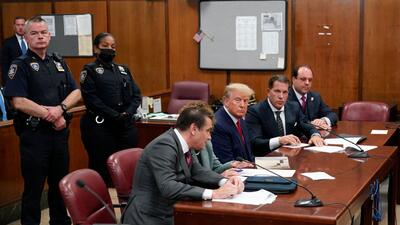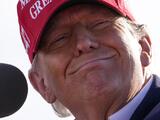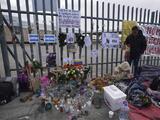The beautiful act of indicting former presidents

NEW YORK – I come from a country – Mexico – where presidents and former presidents have been untouchable.
We have had presidents who were murderers, corrupt, election fraudsters and cheaters, thieves and magicians who suddenly made their relatives very wealthy. And all left office as free men, without facing justice. All of them. That's why I believe the indictment of former US President Donald Trump is so instructive.
It is the first time that happens in more than 240 years of US democracy. Never before did a president or former president face criminal charges. The one who came closest was Richard Nixon in 1974, for Watergate, but he preferred to resign rather than live with the shame of facing criminal charges.
Not Donald Trump. He seems not to know the meaning of shame, guilt or repentance. A state prosecutor in New York has accused him of falsifying documents about the payment of $130,000 to actress Stormy Daniels. In exchange, she was to remain silent about an alleged affair, which he flatly denies.
It all smells of scandal: the denials of an affair, the opaque ways in which the payment was made and the obsessive way in which the country has followed each detail of the legal process.
Never in my entire career have I seen so many journalists covering a trial or a person. But Trump, with his populist genius for creating parallel realities, has taken advantage of the charges against him to raise millions of dollars for his presidential campaign, and along the way improve his standing in polls of possible Republican candidates significantly.
Trump lives in a universe where critics say he feels above the law, the truth and everyone. That's precisely why his legal process is so fascinating – a process not even Trump can escape.
Más sobre Opinion
The charges he faces in New York are minor when compared to the others he may yet face: for inciting the violent mob on January 6 2021, for illegally pressing Georgia officials to “find” more than 11,000 votes and for keeping classified documents in his home. But the law is the law, and the state prosecutors in New York are convinced that Trump broke the law when he falsified the documents and should go to trial.
I wish we could have done something like that with our presidents and former presidents in Latin America.
In Mexico, for example, they have a lot to answer for. All the presidents until 2000 were virtually appointed and elected with fraud. The ruler who ordered the murder of dozens and perhaps hundreds of students at the Tlatelolco plaza in 1968 was never put on trial. Nor the one who allowed the halconazo massacre in 1971. One built himself a tacky mansion in what Mexicans came to call Dog Hill, and another acquired a luxurious white home from a contractor in his government.
It's never been clear how some former presidents live well above the sum of their modest government salaries and pensions. It's hard to understand why some secret budgets have never been made public.
Latin America is also loaded with corrupt and super-wealthy former presidents. Some efforts, not so convincing, have been made to bring the worst abusers to justice in Argentina, Brazil, El Salvador, Honduras, Panama, Colombia and other places. But only in Peru has this practice become a kind of national sport: President is elected, president is jailed. Or almost so. Eight Peruvian presidents have been arrested or faced criminal charges since the end of the Alberto Fujimori presidency in 2000.
Failure to put on trial presidents or former presidents who broke the law or committed crimes can have devastating consequences for the future of a country.
That's what happened in Venezuela. Coup plotter Hugo Chavez should have never been pardoned in 1994 by President Rafael Caldera. Venezuela would have been spared nearly three decades of chaos, terror and uncontrolled corruption. And after the massacre at Puente Llaguno in 2002 – where 12 protesters were murdered, according to the BBC – there was sufficient evidence to put Chavez on trial and legally remove him from power. The Venezuelan opposition did not manage to do it, and lost a historic opportunity to win back the country.
Putting presidents, former presidents and coup plotters on trial is an honorable and necessary practice to maintain a healthy democracy.
It is sad that tyrants like Fidel Castro and Augusto Pinochet did not die in prison. Both were responsible for murders, tortures and multiple violations of human rights. Justice never got to Cuba or Chile.
But it's never too late to start. There are some former Latin American presidents who should not be free. I understand that many presidents, when they win power, prefer to look forward and avoid long and wasteful fights with powerful figures from the past.
But there are times, like in case of Trump and so many others on the continent, when we cannot bury our heads, or morals, in the sand.
The lovely act of putting former presidents on trial is much more about the defense of democracy than a desire for vengeance. It is to bring back down to earth those who abused their immense power. And it is a marvelous lesson for those yet to rule: Do wrong, and we'll clip your wings.


